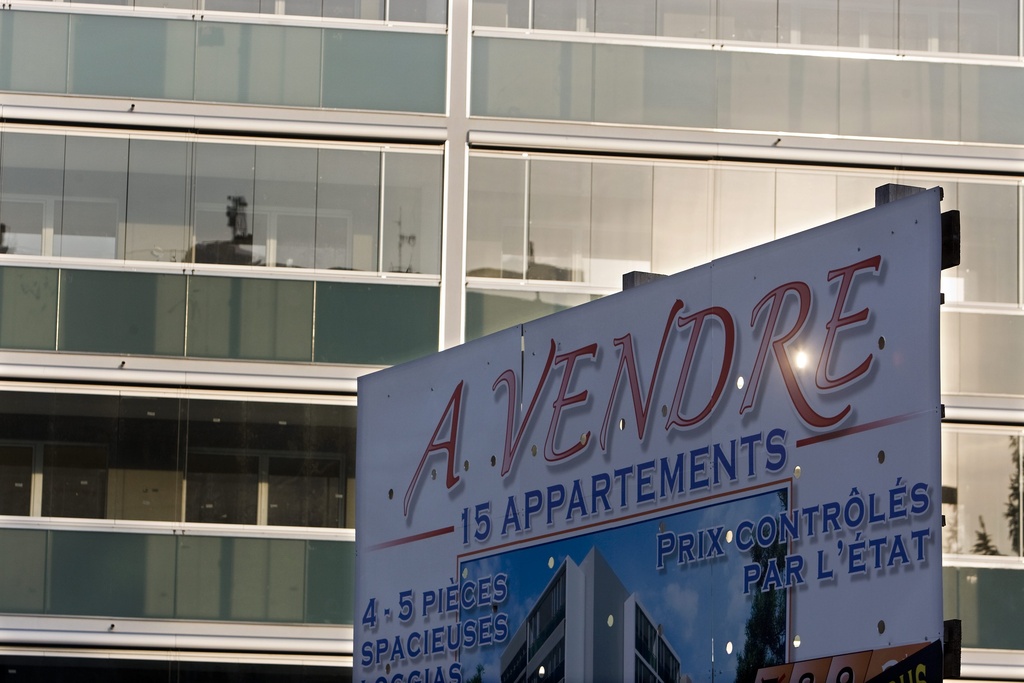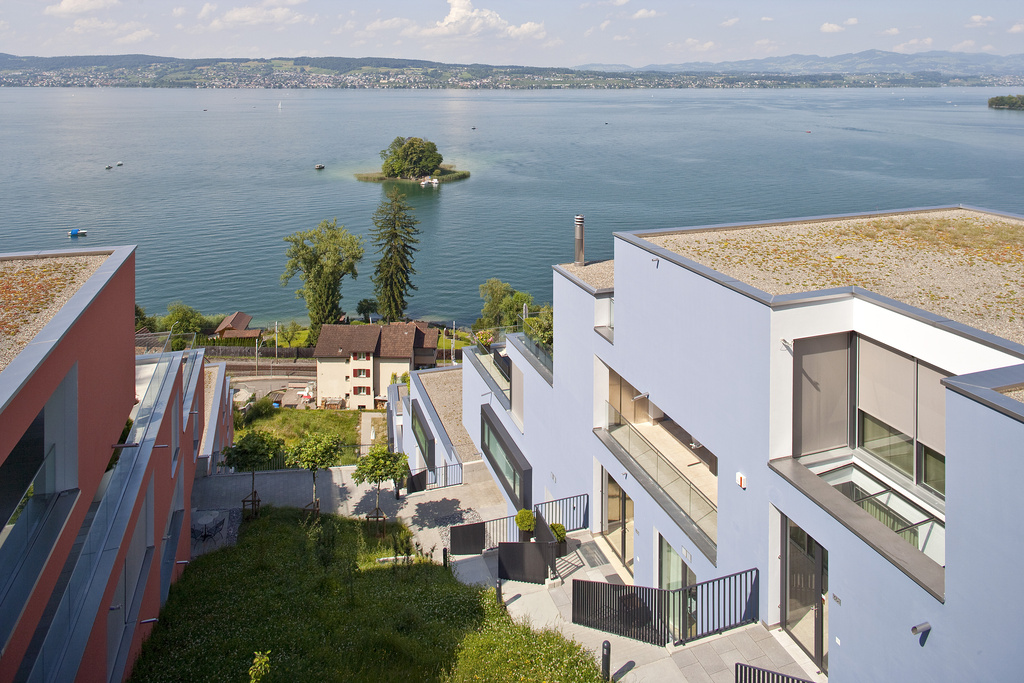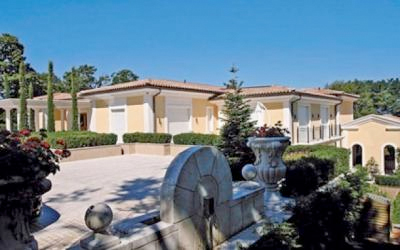House price hotspot concerns refuse to fade

The dramatic rise in the price of residential housing in some areas of Switzerland continues to fuel fears of potential problems in the future.
While there is no talk of a complete housing market collapse, some observers fear a rise in rents and mortgage payment defaults when interest rates eventually climb upwards. Some banks have been warned to improve lending standards.
The solid state of the property market compared to other countries has been a source of pride for Switzerland. Lending standards were tightened after the 1990s crash and a recent influx of foreign workers has sustained demand.
But the new immigrants – mostly well educated and well paid Europeans – have also tended to congregate in Zurich, Geneva, Zug and trendy holiday resorts, thus dramatically pushing up property prices and rents in these areas.
The latest study of prices by real estate company Wuest & Partner shows appreciable rises in these hotspot areas. Single family homes around Lake Geneva are ten per cent more expensive than this time last year while apartments are 11 per cent dearer.
The report confirms large discrepancies in the movement of residential property prices around Switzerland with an average 4.7 per cent country-wide increase for single family dwellings and 2.9 per cent for apartments. The survey identified 60 local communities where property prices are rising fast.
Uncertain future
Opinion is split on whether this pattern is sustainable. Banks and real estate professionals insist that there is little chance of a crash, but other observers, such as think tank Avenir Suisse, are more bearish.
Sitting in the middle is the Swiss National Bank (SNB) that sets interest rates. “There is today no existing grounds for panic,” SNB chairman Philipp Hildebrand said on Thursday. “However, there is also no reason to give the all-clear signal.”
A recent survey by economic research group BAK Basel drew the conclusion that property prices and rents will remain stable at least for the next 12 months as interest rates are unlikely to rise in the face of an expected slowdown in the economy next year.
“For this reason the residential property market might continue to be propped up in the coming months,” BAK stated. “The correction will therefore be delayed to a later time.”
Wuest & Partner expect a significant slowdown in the price of property next year as the economy cools. The company forecasts a 2.2% rise in the price of single family dwellings across Switzerland with 1.4 per cent inflation for apartments.
Lenders’ responsibility
With interest rates set at virtually zero for the past months, employment levels remaining stable and consumer spending continuing to impress, the stage has been set for more people to buy their own property.
But this in turn has set alarm bells ringing at the SNB and the Swiss financial regulator, who have been warning mortgage lenders all year not to allow the competition for new clients to erode standards for issuing credit.
An SNB survey earlier this year found that most lenders are still applying reasonable restraint. But a minority of banks appear to be loosening internal controls in order to capture more business.
On Thursday, SNB chairman Hildebrand again reminded banks of their responsibilities.
“Some banks stand out for a lack of conservative lending criteria,” he said. “They frequently grant credit that does not fulfill the criteria defined by the banks themselves.”
This would represent a serious problem if allowed to get out of hand, according to BAK Basel property expert Marc Puechredon.
“Clearly some prudence must be applied to mortgage lending,” he told swissinfo.ch. “Young people, in particular, should ask themselves if they could cope with interest rate rises.”
Social, economic effects
However, mortgage defaults are less than half of the story in a country where only 40 per cent of the population owns a property.
Rents have been rising continuously in the last ten years, particularly with the arrival of foreign workers. The strict linking of rental increases with interest rates has dampened that effect for now, but many people fear large increases when the economy gets back to long term stability.
Another problem being faced by lower earners is that the rise of property prices and rents is squeezing them out of hotspot areas. For example, many local people in the small city of Zug have been forced to move further afield to find affordable accommodation.
“Many people on normal earnings can no longer find apartments and have to move [to other areas],” former Zug councillor Hanspeter Uster told the NZZ am Sonntag newspaper recently.
The phenomenon was picked up by an immigration study conducted by the Zurich Cantonal Bank last month. It found that new migrant workers from Germany, Austria and Britain were replacing locals and the “old” migrants, typically from Italy or the Balkans, in areas such as Zug.
The trend of more highly skilled workers arriving over the border is slowing down but shows no signs of seriously abating. It has been acknowledged that such workers bring much needed expertise that has boosted the Swiss economy.
But Switzerland is also facing other potential social and economic side effects that have yet to fully surface.
Switzerland’s property market is expected to avoid the type of crash seen in other countries despite fears this summer it was starting to overheat, according to industry insiders.
A continued steady rise in house prices and demand, fuelled by low interest rates, has led to a spate of warnings from top financial officials in the past few months.
Property prices have been heating up in Zurich and around Lake Geneva. House prices have risen to 1990 levels in Zurich and interest rates are likely to remain low for some time.
But mortgage lending in Switzerland has been tight since the country suffered in the property crash of the 1990s. Buyers of residential homes can expect to be asked for a 20 per cent down payment on a property before receiving a loan.
Experts believe that demand for home ownership may start to slacken slightly as the reduced rate of immigration into Switzerland puts a brake on rental prices.
A large influx of foreign workers in the past five years has increased demand for rental flats, but immigration levels are forecast to be only around half as strong as the boom year of 2008.
Switzerland has one of the lowest rates of home ownership in the developed world. The recent trend of rising rents and lowering interest rates has boosted the rate of home ownership to 40 per cent, but this is still well below countries such as Germany 45%, France 54%, Britain and the US 69%, and Spain 81%.
The asking price of single family dwellings has risen 2.9% across Switzerland in the last 10 years while apartments have increased in price by 4.3%, according to Wuest & partner research.
The price rise has been more significant recently. In the past five years the increase has been 3.2%, while such property is 4.7% higher year on year in the last 12 months.
In the biggest hotspot, the Lake Geneva region single family houses are 7.4% more expensive than 10 years ago with a 10% rise in the last 12 months. Prices for apartments rose 8% in the last 10 years and 11% in the last 12 months.
Rents across Switzerland have risen 3.1% over 10 years and 2.5% in the last 12 months. Around Lake Geneva the figures are 6.1% and 8.6%.

In compliance with the JTI standards
More: SWI swissinfo.ch certified by the Journalism Trust Initiative




You can find an overview of ongoing debates with our journalists here . Please join us!
If you want to start a conversation about a topic raised in this article or want to report factual errors, email us at english@swissinfo.ch.